- Top:用于规定要返回的记录数目
*并非所有数据库都支持Top子句
select top number/percent column_names from table_name
eg:select top 5 * from table_1
在MySQL中:
select column_name(s) from table_name limit number
在oracle中:
select column_name(s) from table_name where rownum <= number
- LIKE:在where语句中搜索指定列中的指定模式
“%” 可用于定义通配符(模式中缺少的字母)
select column_name(s) from table_name where column_name like pattern
eg:
select * from Persons where city like 'N%'
select * from persons where city like '%g'
select * from persons where city like '%lon%'
select * from persons where city not like '%lon%'
- 通配符:
必须与like运算符一起使用;
%代替0or多个字符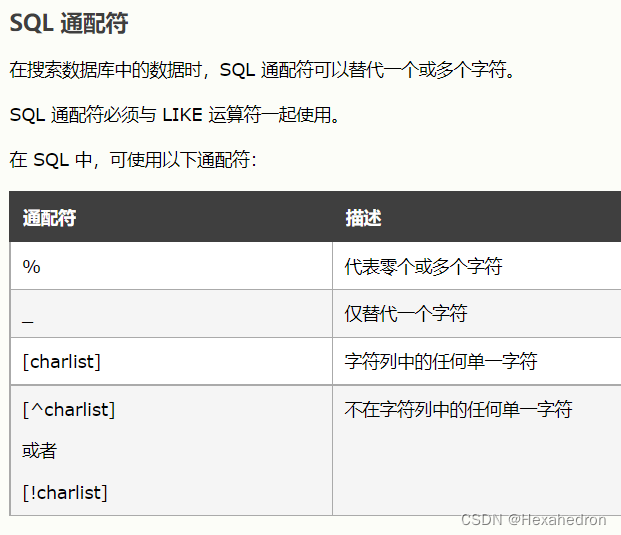
从上面的 "Persons" 表中选取居住的城市以 "A" 或 "L" 或 "N" 开头的人:
select * from persons where city like '[ALN]%'
从上面的 "Persons" 表中选取居住的城市
不以 "A" 或 "L" 或 "N" 开头的人:
select * from persons where city like '[!ALN]%'
- IN操作符:在where句子中规定多个值
select column_name(s) from table_name where column_name in (value1,value2,...)
- between 操作符:在where语句中使用,选取介于两者之间的数据范围
*取值是否包括value1和value2由不同的数据库决定,存在差异性
select column_name(s) from table_name where column_name between value1 and value2
select column_name(s) from table_name where column_name not between value1 and value2
- alias:为列名称和表名称指定别名
表的SQL ALIAS用法:
select column_name(s)
from table_name as alias_name
列的SQL ALIAS用法:
select column_name(s) as alias_name
from table_name
- join:根据两个或多个表中的列之间的关系,从这些表中查询数据
数据库中的表可通过键将彼此联系起来。主键(Primary Key)是一个列,在这个列中的每一行的值都是唯一的。在表中,每个主键的值都是唯一的。这样做的目的是在不重复每个表中的所有数据的情况下,把表间的数据交叉捆绑在一起。
inner join:在表中存在至少一个匹配时,INNER JOIN 关键字返回行。
*inner join 和 join相同
select column_name(s)
from table_name1
inner join table_name2
on table_name1.column_name=table_name2.column_name
left join:从左表 (table_name1) 那里返回所有的行,即使在右表 (table_name2) 中没有匹配的行
*在某些数据库中, LEFT JOIN 称为 LEFT OUTER JOIN
select column_name(s)
from table_name1
left join table_name2
on table_name1.column_name = table_name2.column_name
right join:从右表 (table_name2) 那里返回所有的行,即使在左表 (table_name1) 中没有匹配的行
*在某些数据库中, right JOIN 称为 right OUTER JOIN
select column_name(s)
from table_name1
right join table_name2
on table_name1.column_name = table_name2.column_name
full join:只要其中某个表存在匹配,FULL JOIN 关键字就会返回行
*在某些数据库中, full JOIN 称为full OUTER JOIN
select column_name(s)
from table_name1
full join table_name2
on table_name1.column_name=table_name2.column_name
- union:合并两个or多个select 语句的结果集;简而言之,合并表结果
UNION 内部的 SELECT 语句必须拥有相同数量的列。列也必须拥有相似的数据类型。同时,每条 SELECT 语句中的列的顺序必须相同
UNION 结果集中的列名总是等于 UNION 中第一个 SELECT 语句中的列名
SELECT column_name(s) FROM table_name1
UNION
SELECT column_name(s) FROM table_name2
#默认选取不同的值;若允许重复,则使用union all
SELECT column_name(s) FROM table_name1
UNION ALL
SELECT column_name(s) FROM table_name2
- select into:主要指从一个表中选取数据插入另一个表中,创建表的备份复件或存档
select *
into new_table_name[in externaldatabase]
from old_tablename
eg:
备份复件:
select *
into new_tablename
from old_tablename
in子句可用于从另一个database中拷贝:
select *
into persons in 'backup.mdb'
from persons
仅拷贝某些域:
select lastname,firstname
into persons_backup
from persons
也可以从多个表中选取数据:
select lastname,firstname
into persons_backup
from persons
inner join orders
on persons.id_p=orders.id_p
- create database:创建数据库
create database database_name
- create table:创建表
create table table_name
(
列名称1 数据类型,
列名称2 数据类型,
列名称3 数据类型,
....
)
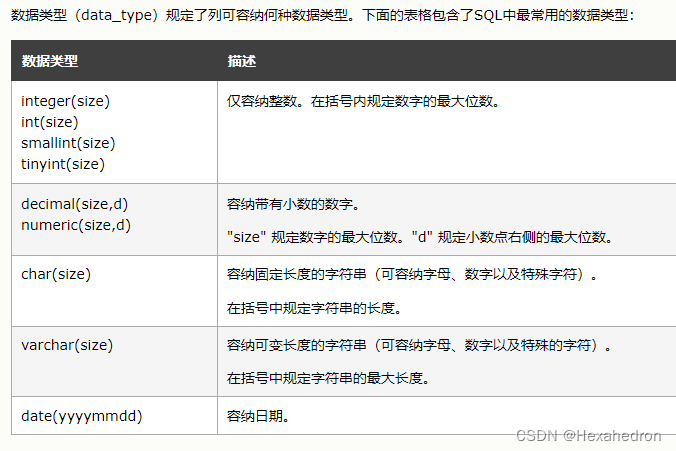
- SQL约束:限制加入表的数据类型
not full:约束强制列不接受 NULL 值;强制字段始终包含值。这意味着,如果不向字段添加值,就无法插入新记录或者更新记录?
unique:约束唯一标识数据库表中的每条记录;
PRIMARY KEY 拥有自动定义的 UNIQUE 约束。
每个表可以有多个 UNIQUE 约束,但是每个表只能有一个 PRIMARY KEY 约束
在MySQL中:
create table persons
(
Id_P int not null,
city varchar(250),
unique(Id_P)
)
在oracle/MS Access/SQL Server中:
create table Persons
(
Id_P int not null unique,
city varchar(250)
)
若需要命名unique约束,且为多个列定义unique:
create table persons
(
Id_P int not null,
city varchar(250),
constraint uc_personid unique(Id_P,city)
)
若表已被创建,需定义某一列unique:
alter table persons
add unique(Id_P)
若表已被创建,需命名约束,定义多列unique:
alter table persons
add constraint uc_personid unique(Id_P,city)
若需撤销unique约束:
在MySQL中:
alter table persons
drop index uc_personid
在oracle/MS Access/SQL Server中:
alter table persons
drop constraint uc_personid
- primary key:主键,约束唯一标识数据库表中的每条记录;包含唯一值;不包含null值;每个表都有且只有一个主键
在MySQL中:
create table persons
(
Id_P int not null
primary key(Id_P)
)
在oracle/MS Access/SQL Server中:
create table persons
(
Id_P int not null primary key
)
若需命名primary key,且为多个列定义primary key约束:
create table persons
(
Id_P int not null,
city varchar(250),
constraint pk_personid primary key (Id_P,city)
)
若表已被创建,需为某一列创建primary key约束:
alter table persons
add primary key(Id_P)
若需命名primary key,且为多个列定义:
alter table persons
add constraint pk_personid primary key(Id_P,city)
若需撤销primary key约束:
在MySQL中:
alter table person
drop primary key
在oracle/MS Access/SQL Server中:
alter table person
drop constraint pk_personid
- foreign key:外键,指向另一个表中的primary key;用于预防破坏表之间连接的动作,防止非法数据插入外键列
在MySQL中:
create table orders
(
Id_O int not null,
Id_P int,
primary key (Id_O),
foreign key(Id_P) references persons(Id_P)
)
在oracle/MS Access/SQL Server中:
create table orders
(
Id_O int not null primary key,
Id_P int foreign key references persons(Id_P)
)
若需命名foreign key约束,且为多个列定义foreign key:
create table orders
(
Id_O int not null,
Id_P int,
primary key (Id_O),
constraint fk_perorders foreign key (Id_P)
references persons(Id_P)
)
若在表已存在的情况下,创建foreign key约束:
alter table orders
add foreign key (Id_P)
references persons(Id_P)
若在表存在的情况下,需命名foreign key约束,且为多个列定义foreign key:
alter table orders
add constraint fk_perorders
foreign key (Id_P)
references persons(Id_P)
若需撤销foreign key约束:
在MySQL中:
alter table orders
drop foreign key fk_perorders
在oracle/MS Access/SQL Server中:
alter table orders
drop constraint fk_perorders
- check约束:用于限制列中值的范围;
在MySQL中:
create table persons
(
Id_P int not null,
check(Id_P>0)
)
在oracle/MS Access/SQL Server中:
create table persons
(
Id_P int not null check(Id_P>0)
)
若需要命名 CHECK 约束,以及为多个列定义 CHECK 约束:
create table persons
create table persons
(
Id_P int not null,
city varchar(250),
constraint chk_person check (Id_P>0 and city='Sandnes')
)
若在表存在的情况下,需为某一列创建check约束:
alter table persons
add check(Id_P>0)
若在表存在的情况下,需为多列创建check约束且命名:
alter table persons
add constraint chk_person check(Id_P>0 and city='Sandnes')
若需撤销check约束:
在MySQL中:
alter table persons
drop check chk_person
在oracle/MS Access/SQL Server中:
alter table persons
drop constraint chk_person
- default约束:向列中插入默认值;
在创建表时插入值:
create table persons
(
city varchar(250) default 'Sandnes'
)
#利用函数getdate()可插入系统值
create table orders
(
city varchar(250) default **getdate()**
)
若表已存在,向某列插入值:
在MySQL中:
alter table persons
alter city set default 'Sandnes'
在oracle/MS Access/SQL Server中:
alter table persons
alter column city set default 'Sandnes'
若需要撤销Default约束:
在MySQL中:
alter table persons
alter city drop default
在oracle/MS Access/SQL Server中:
alter table persons
alter column city drop default
- create index:在表中创建索引;方便应用程序在不读取整个表的情况下更快查找数据
用户无法看到索引,它们只能被用来加速搜索/查询。
更新一个包含索引的表需要比更新一个没有索引的表更多的时间,这是由于索引本身也需要更新。因此,理想的做法是仅仅在常常被搜索的列(以及表)上面创建索引。
create index index_name
on table_name(column_name1,column_name2)
在表中创建一个唯一的索引给,意味着两个行不能拥有相同索引值:
create unique index index_name
on table_name(column_name)
- drop:删除索引跟、表、数据库
drop index: 删除索引
在MySQL中:
ALTER TABLE table_name DROP INDEX index_name
在Microsoft SQLJet (以及 Microsoft Access) 中:
drop index index_name on table_name
在MS SQL Server 中:
DROP INDEX table_name.index_name
在IBM DB2 和 Oracle中:
DROP INDEX index_name
drop table:删除表drop table 表名称
drop database:删除数据库drop database 数据库名称
truncate table:删除表数据但不删除表truncate table 表名称
- alter table:在已有表中增、删、改列
添加列:
alter table table_name
add column_name datatype
删除列:
alter table table_name
drop column column_name
#或者:
alter table table_name
alter column column_name datatype
- auto-increment:在新记录插入表中时生成一个唯一的数字
在MySQL中:
create table persons
(
P_Id int not null auto_increment,
PRIMARY KEY (P_Id)
)
默认开始值为1,每条递增1;若需要从其他值开始:
alter table persons AUTO_INCREMENT=100
在MS SQL中,使用identify来执行auto-increment:
create table persons
(
P_Id int PRIMARY KEY identity
)
默认开始值为1,每条递增1;若需要从20开始且递增10:
create table persons
(
P_Id int PRIMARY KEY identity(20,10)
)
在Access中,使用auto-increment:
create table persons
(
P_Id int PRIMARY KEY autoincrement(20,10)
)
在oracle中,需先创建auto-increment字段:
通过对sequence创建auto-increment字段:
CREATE SEQUENCE seq_person
MINVALUE 1
START WITH 1
INCREMENT BY 1
CACHE 10
- view:视图
create view:创建视图
create view view_name as
select column_name(s)
from table_name
where condition
查询视图:select * from [ view_name ]
更新视图:
sql create or replace view Syntax
create or replace view view_name as
select column_name(s)
from table_name
where condition
撤销视图:
drop view view_name
-
date函数:如果不含时间部分可以更好处理和查询~
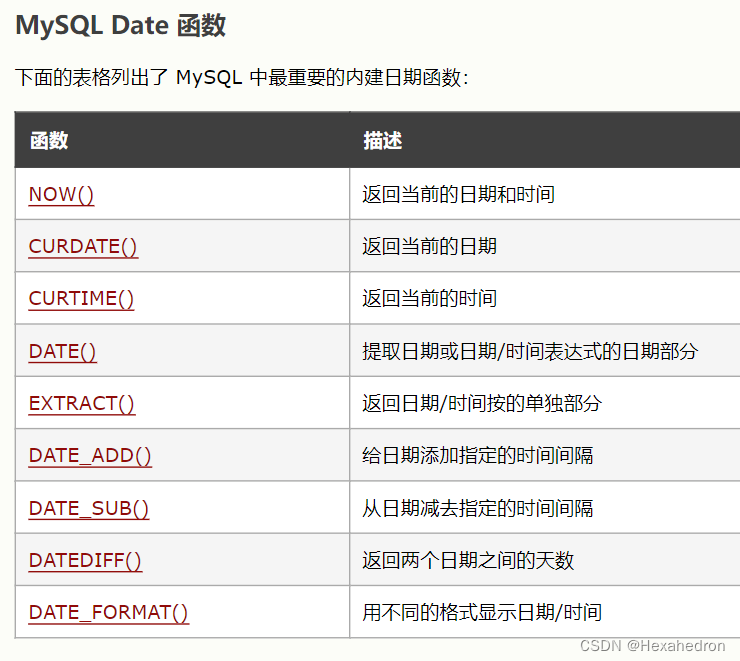
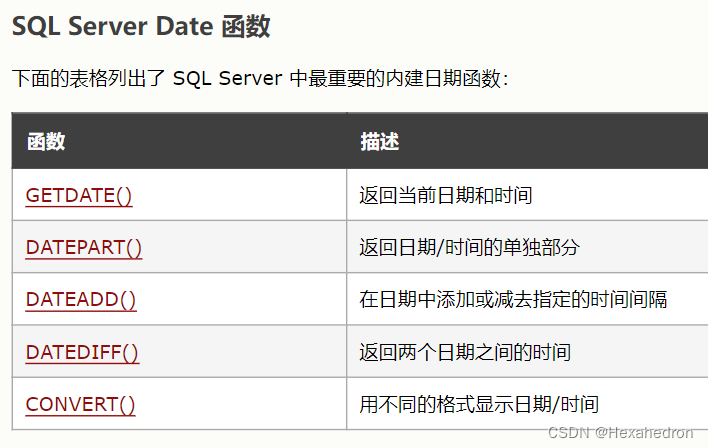
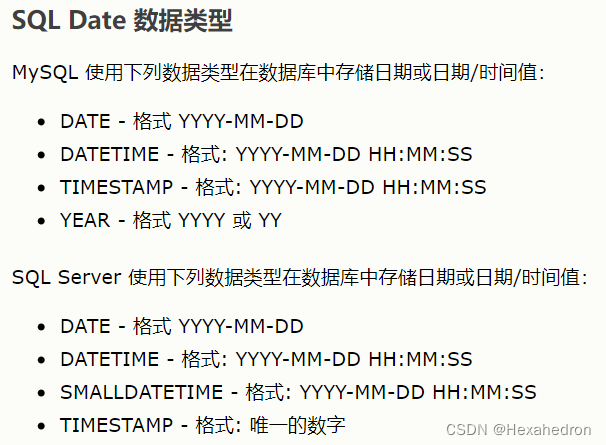
-
null
is null操作符:查找null值
select column_name(s) from table_name
where column_name is null
is not null:
select column_name(s) from table_name
where column_name is null
-
null函数:如何处理null值
在MySQL中:ifnull(column_name,值)、coalesce(column_name,值)
在SQL Server / MS Access中:isnull(column_name,值)
在oracle中:nvl(column_name,值) -
SQL数据类型
在MySQL中,主要有三种类型:文本、数字和日期/时间
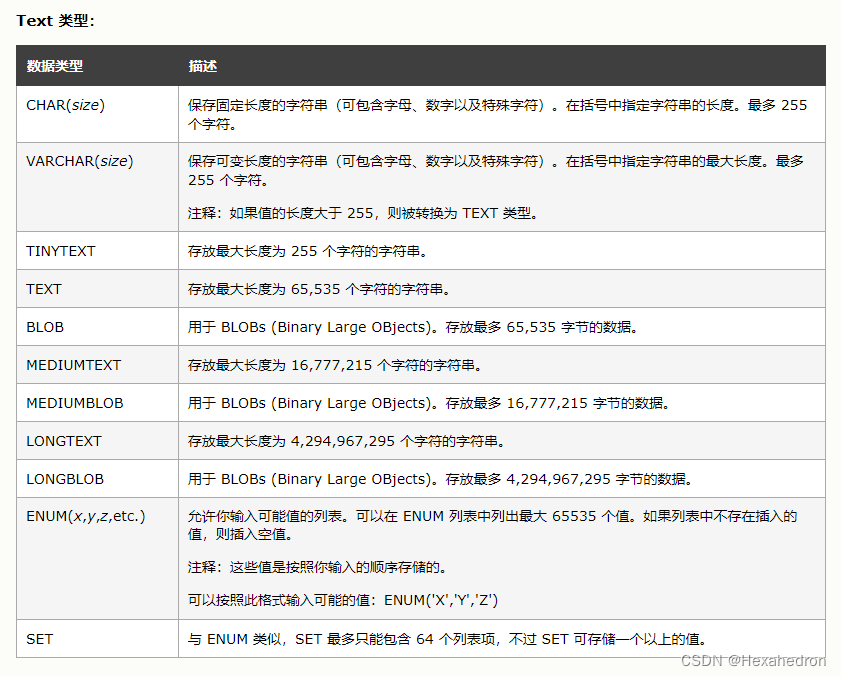
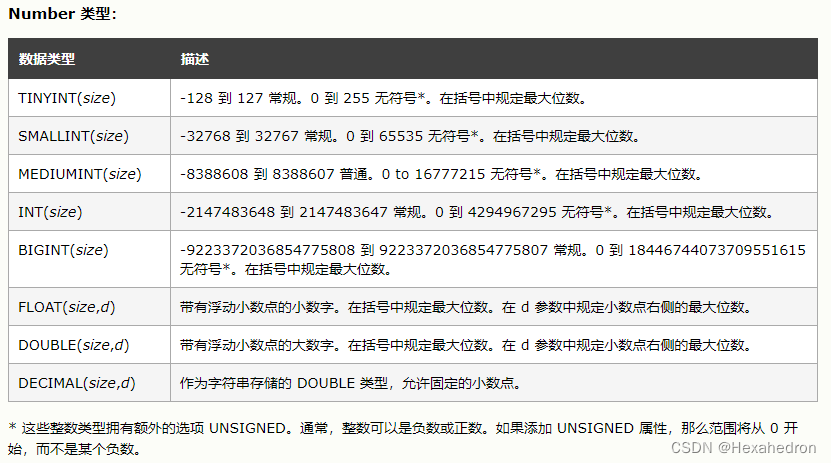
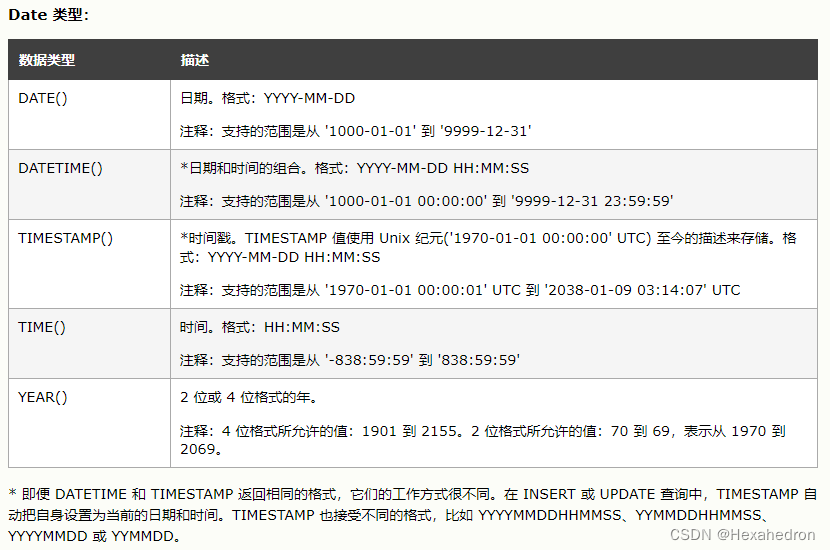
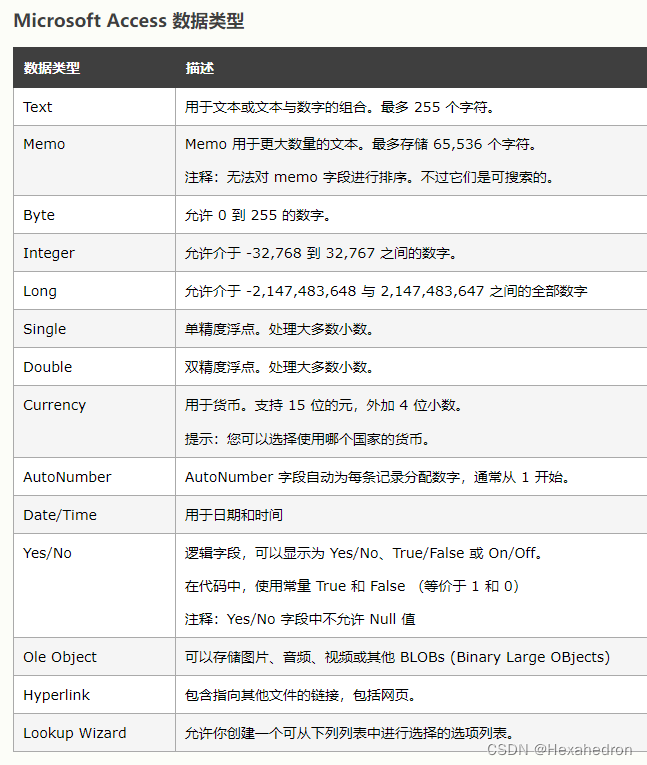
其余更多,请参考:添加链接描述
- RDBMS:SQL服务器
DBMS - 数据库管理系统(Database Management System)
数据库管理系统是一种可以访问数据库中数据的计算机程序。
DBMS 使我们有能力在数据库中提取、修改或者存贮信息。
不同的 DBMS 提供不同的函数供查询、提交以及修改数据。
RDBMS - 关系数据库管理系统(Relational Database Management System)
关系数据库管理系统 (RDBMS) 也是一种数据库管理系统,其数据库是根据数据间的关系来组织和访问数据的。





 本文介绍了SQL中的关键概念,包括TOP用于限制返回的记录数,LIKE用于模式匹配,IN和BETWEEN操作符,以及JOIN、UNION等联接查询。还讲解了数据库中的别名、约束(如NOT NULL、UNIQUE、PRIMARY KEY、FOREIGN KEY和CHECK)以及索引的重要性和使用。最后提到了视图和日期函数的应用,以及SQL数据类型和数据库管理系统的基本知识。
本文介绍了SQL中的关键概念,包括TOP用于限制返回的记录数,LIKE用于模式匹配,IN和BETWEEN操作符,以及JOIN、UNION等联接查询。还讲解了数据库中的别名、约束(如NOT NULL、UNIQUE、PRIMARY KEY、FOREIGN KEY和CHECK)以及索引的重要性和使用。最后提到了视图和日期函数的应用,以及SQL数据类型和数据库管理系统的基本知识。
















 2890
2890

 被折叠的 条评论
为什么被折叠?
被折叠的 条评论
为什么被折叠?








